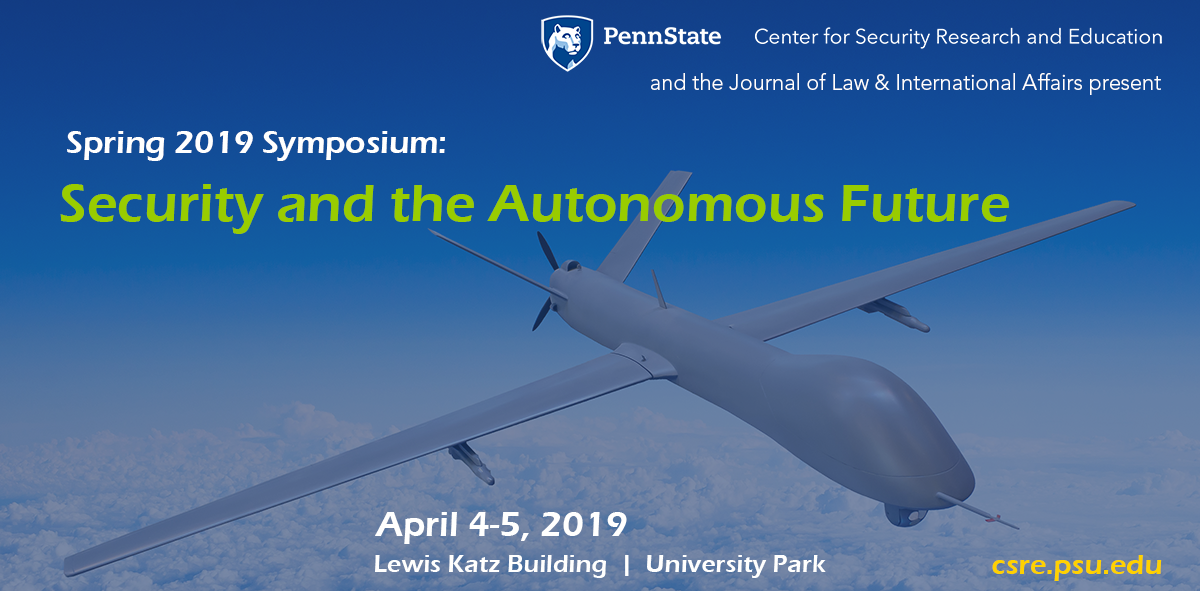UNIVERSITY PARK, Pa. – Registration is now open for Security and the Autonomous Future, an upcoming symposium sponsored jointly by the Penn State Center for Security Research and Education (CSRE) and the Penn State Journal of Law and International Affairs (JLIA). The two-day event will bring together Penn State faculty and other national experts to explore how autonomous systems will affect our personal, national, and global security.
The symposium is free and open to the public, and will take place on April 4-5, 2019, in the Lewis Katz Building. Register online by March 29.
Six CLE credits are available to attendees. Those seeking CLE credits will be charged $25 upon registration.
“As we’ve seen in recent years, promising new technology often comes with unintended consequences,” said CSRE Director James W. Houck. “Our symposium is designed to give experts as well as our broader Penn State community a chance to consider the benefits and risks of autonomous systems before we fully embrace them.”
JLIA hosts a research symposium each year in the spring, and its editors welcomed the opportunity to partner with CSRE for this year’s event and focus on a dynamic and relevant topic that impacts international law and affairs.
“Autonomous weapons are prolific around the world and their use is infiltrating many discussions including ethics, control and liability, and warfare,” said Allison Amatuzzo, managing editor of communications for JLIA and a current 3L at Penn State Law. “The question now is how do we navigate those issues, which is the primary motivation for putting this symposium together—to spark an informed and engaged discussion among a wide range of perspectives.”
CSRE and JLIA are excited to announce Paul Scharre as the symposium’s keynote speaker. Scharre is a senior fellow and director of the Technology and National Security Program at the Center for a New American Security and author of Army of None: Autonomous Weapons and the Future of War, published in April 2018.
From 2008-2013, Scharre worked in the Office of the Secretary of Defense (OSD) where he played a leading role in establishing policies on unmanned and autonomous systems and emerging weapons technologies. Scharre led the DoD working group that drafted DoD Directive 3000.09, establishing the Department’s policies on autonomy in weapon systems. He also led DoD efforts to establish policies on intelligence, surveillance, and reconnaissance (ISR) programs and directed energy technologies. He was involved in the drafting of policy guidance in the 2012 Defense Strategic Guidance, 2010 Quadrennial Defense Review, and Secretary-level planning guidance. His most recent position was special assistant to the under secretary of defense for policy.
In addition to Scharre’s keynote address, the symposium will include five panels addressing the intersection of autonomous systems with critical security issues:
Autonomous Systems and Emerging Technology, moderated by Sarah Rajtmajer, assistant professor of information sciences and technology at Penn State.
Autonomous Systems and the Ethics of Conflict, moderated by Ben Jones, assistant director of The Rock Ethics Institute at Penn State.
Autonomous Systems and International Norms, moderated by Tiyanjana Maluwa, H. Laddie Montague Chair in Law and professor of law and international affairs at Penn State.
Autonomous Systems and Domestic Security, moderated by Anne McKenna, distinguished scholar of cyberlaw and policy at Penn State Dickinson Law and professor of practice at the Institute for Cyberscience at Penn State.
Autonomous Systems and the Meaning of Humanity, moderated by Ben Johnson, assistant professor of law at Penn State Law.
Beyond the moderators, the symposium will feature nearly 20 experts in a variety of fields from universities, think tanks, research centers, and private businesses across the country.
For more information, and to register, please visit the symposium event page online.

